
Brainwashing is the concept that the human mind can be altered or controlled by certain psychological techniques. Brainwashing is said to reduce its subject's ability to think critically or independently, to allow the introduction of new, unwanted thoughts and ideas into their minds, as well as to change their attitudes, values, and beliefs.

Władysław Stanisław Reymont was a Polish novelist and the 1924 laureate of the Nobel Prize in Literature. His best-known work is the award-winning four-volume novel Chłopi.

The Gulag Archipelago: An Experiment in Literary Investigation is a three-volume non fictional series written between 1958 and 1968 by the Russian writer and Soviet dissident Aleksandr Solzhenitsyn. It was first published in 1973, and it was translated into English and French the following year. It describes life in what is often known as the Gulag, the Soviet forced labour camp system, through a narrative which was constructed from various sources including reports, interviews, statements, diaries, legal documents, and Solzhenitsyn's own experience as a Gulag prisoner.
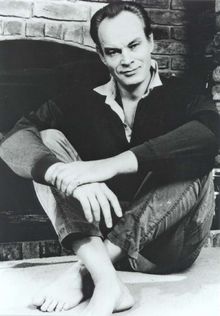
David Andrew Gemmell was a British author of heroic fantasy, best known for his debut novel, Legend. A former journalist and newspaper editor, Gemmell had his first work of fiction published in 1984. He went on to write over thirty novels. Gemmell's works display violence, yet also explore themes of honour, loyalty and redemption. There is always a strong heroic theme but nearly always the heroes are flawed in some way. With over one million copies sold, his work continues to sell worldwide.

Octave Mirbeau was a French novelist, art critic, travel writer, pamphleteer, journalist and playwright, who achieved celebrity in Europe and great success among the public, whilst still appealing to the literary and artistic avant-garde with highly transgressive novels that explored violence, abuse and psychological detachment. His work has been translated into 30 languages.

Gene Rodman Wolfe was an American science fiction and fantasy writer. He was noted for his dense, allusive prose as well as the strong influence of his Catholic faith. He was a prolific short story writer and novelist, and won many literary awards. Wolfe has been called "the Melville of science fiction", and was honored as a Grand Master by the Science Fiction and Fantasy Writers of America.

Portnoy's Complaint is a 1969 American novel by Philip Roth. Its success turned Roth into a major celebrity, sparking a storm of controversy over its explicit and candid treatment of sexuality, including detailed depictions of masturbation using various props including a piece of liver. The novel tells the humorous monologue of "a lust-ridden, mother-addicted young Jewish bachelor," who confesses to his psychoanalyst in "intimate, shameful detail, and coarse, abusive language."
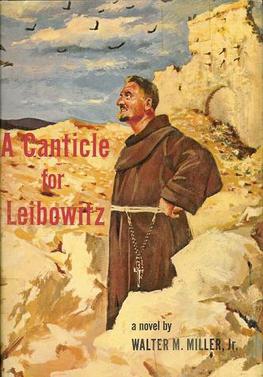
A Canticle for Leibowitz is a post-apocalyptic social science fiction novel by American writer Walter M. Miller Jr., first published in 1959. Set in a Catholic monastery in the desert of the southwestern United States after a devastating nuclear war, the book spans thousands of years as civilization rebuilds itself. The monks of the Albertian Order of Leibowitz preserve the surviving remnants of man's scientific knowledge until the world is again ready for it.

William Anthony Parker White, better known by his pen name Anthony Boucher, was an American author, critic, and editor who wrote several classic mystery novels, short stories, science fiction, and radio dramas. Between 1942 and 1947, he acted as reviewer of mostly mystery fiction for the San Francisco Chronicle. In addition to "Anthony Boucher", White also employed the pseudonym "H. H. Holmes", which was the pseudonym of a late-19th-century American serial killer; Boucher would also write light verse and sign it "Herman W. Mudgett".

The Magazine of Fantasy & Science Fiction is a U.S. fantasy and science fiction magazine, first published in 1949 by Mystery House, a subsidiary of Lawrence Spivak's Mercury Press. Editors Anthony Boucher and J. Francis McComas had approached Spivak in the mid-1940s about creating a fantasy companion to Spivak's existing mystery title, Ellery Queen's Mystery Magazine. The first issue was titled The Magazine of Fantasy, but the decision was quickly made to include science fiction as well as fantasy, and the title was changed correspondingly with the second issue. F&SF was quite different in presentation from the existing science fiction magazines of the day, most of which were in pulp format: it had no interior illustrations, no letter column, and text in a single-column format, which in the opinion of science fiction historian Mike Ashley "set F&SF apart, giving it the air and authority of a superior magazine".
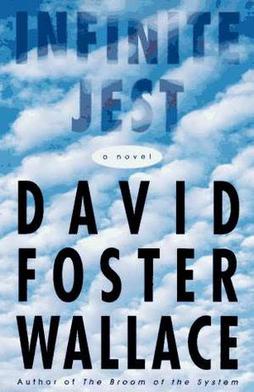
Infinite Jest is a 1996 novel by American writer David Foster Wallace. Categorized as an encyclopedic novel, Infinite Jest is featured in Time magazine's list of the 100 best English-language novels published between 1923 and 2005.

Donald Ewen Cameron was a Scottish-born psychiatrist. He is largely known today for his central role in unethical medical experiments, and development of psychological and medical torture techniques for the CIA. He served as president of the American Psychiatric Association (1952–1953), Canadian Psychiatric Association (1958–1959), American Psychopathological Association (1963), Society of Biological Psychiatry (1965) and the World Psychiatric Association (1961–1966).
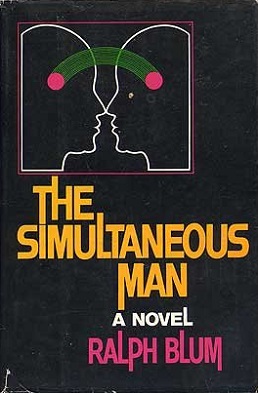
The Simultaneous Man is a 1970 science fiction novel by Ralph Blum, where brainwashing and psychosurgery techniques are used to create a copy of the experiences and memories of one person in the body of another.

The Castle of Iron is the title of a fantasy novella by American authors L. Sprague de Camp and Fletcher Pratt, and of the novel into which it was later expanded by the same authors. It was the third story in their Harold Shea series. As a 35,000-word novella it was first published in the fantasy magazine Unknown for April, 1941. The revised and expanded novel version was first published in hardcover by Gnome Press in 1950, and in paperback by Pyramid Books in 1962. The book has been reprinted by a number of other publishers since its first appearance. An e-book edition was published by Gollancz's SF Gateway imprint on September 29, 2011 as part of a general release of de Camp's works in electronic form. The novel has been combined with other books in the series in the omnibus editions The Compleat Enchanter (1975), The Complete Compleat Enchanter (1989) and The Mathematics of Magic: The Enchanter Stories of L. Sprague de Camp and Fletcher Pratt (2007). It has also been translated into Italian.

Taha Hussein was one of the most influential 20th-century Egyptian writers and intellectuals, and a figurehead for the Arab Renaissance and the modernist movement in the Arab world. His sobriquet was "The Dean of Arabic Literature" . He was nominated for the Nobel Prize in Literature twenty-one times.
Edward Hunter was an American writer, journalist, propagandist, and intelligence agent who was noted for his anticommunist writing. He was a recognized authority on psychological warfare. Both contemporary psychologists and later historians would criticize the accuracy and basis of his reports on brainwashing, but the concept nevertheless became influential in the Cold War-era United States.
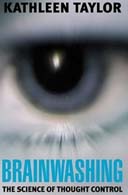
Brainwashing: The Science of Thought Control is a 2004 popular science book explaining mind control, which is also known as brainwashing, thought reform and coercive persuasion, by neuroscientist and physiologist Kathleen Taylor. It explains the neurological basis for reasoning and cognition in the brain, and proposes that the self is changeable, and describes the physiology of neurological pathways. It reviews case studies including Patty Hearst, the Manson Family, and the mass murder/suicide of members of Peoples Temple at Jonestown, and compares the techniques of influence used by cults to those of totalitarian and communist societies. It lays out a model FACET – Freedom, Agency, Complexity, Ends-not-means, and Thinking – which she believes can be used to negate the influence of brainwashing techniques.
Doublethink is a process of indoctrination in which subjects are expected to simultaneously accept two conflicting beliefs as truth, often at odds with their own memory or sense of reality. Doublethink is related to, but differs from, hypocrisy.

Nineteen Eighty-Four is a dystopian social science fiction novel and cautionary tale by English writer George Orwell. It was published on 8 June 1949 by Secker & Warburg as Orwell's ninth and final book completed in his lifetime. Thematically, it centres on the consequences of totalitarianism, mass surveillance and repressive regimentation of people and behaviours within society. Orwell, a democratic socialist, modelled the authoritarian state in the novel on the Soviet Union in the era of Stalinism, and Nazi Germany. More broadly, the novel examines the role of truth and facts within societies and the ways in which they can be manipulated.
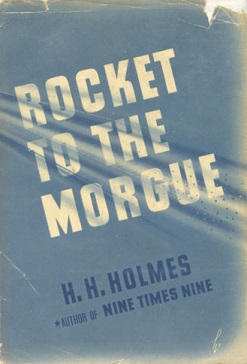
Rocket to the Morgue is a 1942 American locked room mystery novel by Anthony Boucher.


















